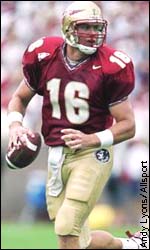

 Mel Kiper Jr. vs. Chris "Mad Dog" Russo Real: 28.8 Tony Kornheiser Show wav: 554 k Real: 14.4 | 28.8 | 56.6 Mel Kiper's archive: reviews, notebooks Kiper's archive: Sleepers of the Week Mel Kiper's archive: Q&As |
| E S P N . C O M | M E L 'S B I O | C O L L E G E F O O T B A L L | H O M E |
|
Friday, December 15 Age-based voters should lose vote By Mel Kiper ESPN.com I was provided a forum recently on ESPN's SportsCenter, hosted by Trey Wingo, to debate with Chris Russo of WFAN in New York the issue of whether age should be a factor in the Heisman voting as it pertains to Florida State's Chris Weinke. Weinke, 28, was actually not included on the ballot of some voters, including Russo. I have a major problem with that.
Had this been based on an evaluation that compared his performance level to other players, I would have had no problem with this type of subjective analysis. Everyone views player performance differently. But to formulate a voting decision based solely on Weinke's age is flat-out not the right or just thing to do. Is there a written or unwritten rule that I don't know about which states that any player over 25 years of age is ineligible for the Heisman Trophy? No, there is not. That's why I said those who used the age argument to leave Weinke off the ballot should never have a vote for the Heisman Trophy again. Creating a new set of rules and guidelines distorts the entire process. My question is this: Why didn't certain voters factor in the obstacles Weinke had to overcome in order to perform at such a high level over the last three years? And how about character and leadership? Shouldn't any player, be it for the Heisman or any other award and also the NFL draft, be evaluated in totality? Yes, they should! In Weinke's case, he overcame tremendous obstacles over the last three years. Returning to the gridiron after six years away from the game as he pursued a career in major-league baseball is certainly not an easy transition. Just ask Georgia's Quincy Carter and LSU's Josh Booty. Then, late in the '98 season, came a severe neck injury, which required major surgery. At the time, Weinke's football future was very much in question. He not only managed to work his way back on the field, but was also able to perform at an All-America level. Remember, with Weinke out in '98, the Seminoles lost to Tennessee in the national championship game at the Tostitos Fiesta Bowl. The next year, with Weinke under center, FSU won the national championship, defeating Virginia Tech in the Nokia Sugar Bowl. Now, he has the Seminoles once again poised to win back-to-back national championships. Keep in mind, Weinke was operating this season with basically a new-look wide receiving corps because Peter Warrick, Ron Dugans and Laveranues Coles had moved on to the NFL. He also was forced to finish drives, knowing that kicker Sebastian Janikowski was no longer available to drill field goals from long range. Through it all, Weinke was a true team leader who represented Florida State with class and dignity. And despite the decision of some to leave him off the ballot, he was still named the 2000 Heisman Trophy winner. Congratulations, Chris, you are a winner in every sense of the word. NFL prospects of the top Heisman vote-gettersOver the years, winning the Heisman Trophy hasn't always guaranteed success in the NFL. With that in mind, I thought it would be a good time to look at the future pro potential of the top Heisman finishers. Chris Weinke: At 6-foot-4 and 233 pounds, Weinke sees the field when he drops back in the pocket and has shown the ability this season to better avoid the initial pass rusher. He's not going to beat you with his legs, but he can bide just enough time to allow his third and fourth options in the progression to break open late. His arm strength is more than adequate, with improvement in footwork and fundamentals evident this season. And by dropping his weight from 250 to 233 pounds over the last year, he even seemed to become a more accurate passer. By returning for his senior campaign, Weinke elevated his pro grade considerably. Last year, he may have dropped in to the fourth or fifth round. Now, though, he may hear his name called as early as Round 2. And guess what? There are even those who believe he could possibly get drafted late in the first round. Josh Heupel: Throughout the 2000 season, I've always viewed Heupel as a left-handed version of former Heisman Trophy winner Danny Wuerffel, but with more mobility. While Heupel is an impressive field general who operates at his best in clutch situations, the questionable arm strength creates some doubt about how effective he can be in the NFL. I expected Wuerffel to be an undrafted free agent, yet he was selected in Round 4 by the Saints and Mike Ditka. Even though Heupel has more mobility, I would still view him as a late-rounder or undrafted free agent. Drew Brees: While he posted huge numbers in Joe Tiller's sophisticated passing scheme, Brees will have to prove during combine/individual workouts that he isn't just a product of Tiller's system. That's where he'll have to show he has the arm strength to get the job done as a starting QB in any pro attack. Also keep in mind, Brees measures out at just under 6-foot-1. For now, Brees is still a wild card to be picked in the first round. If his workouts are impressive, he could land in the mid-first round area. If questions arise about his ability to throw into the wind in the various NFL stadiums where weather is a factor, you could see him drop into the late first or early-mid second round. By the way, as far as my ratings are concerned, Brees won't carry as high a grade as Chad Pennington did last year, and Pennington still dropped to the Jets at No. 18. LaDainian Tomlinson: Ran wild for Dennis Franchione over the last two years, so you definitely can't argue with his productivity. The compact 5-foot-10, 220-pounder also shows breakaway speed, outstanding balance in traffic and the strength to bust tackles. You also have to factor in heavily that he accomplished those eye-catching rushing totals despite being a marked man every week. The concern with Tomlinson is that he benefited from TCU's option attack and was also not utilized heavily as a pass-receiving option out of the backfield. After all is said and done, he could end up being the second or third running back taken on draft day. However, in my ratings, he won't even be close to Ole Miss's Deuce McAllister, who I feel is by far the elite senior prospect available in the draft. Copyright ©2000 ESPN Internet Ventures. Click here for Terms of Use and Privacy Policy applicable to this site. |
